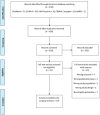Euthanasia in Africa: A scoping review of empirical evidence
- PMID: 37260738
- PMCID: PMC10227490
- DOI: 10.1002/hsr2.1239
Euthanasia in Africa: A scoping review of empirical evidence
Abstract
Background and aims: The core ethical perplexity is that physician-assisted suicide and euthanasia (PAS/E) contradicts the core value of medical practice which is about the duty of care to preserve life. While most arguments for and against euthanasia emerge from other continents, no African country legalizes or decriminalizes PAS/E. The essence of this scoping review is to collate evidence and scientific voices on euthanasia in Africa by synthesizing empirical articles on the subject in Africa.
Methods: In this scoping review, a systematic search of five electronic research databases-PubMed, SCOPUS, CINHAL Complete, Allied and Complementary Medicine (AMED), and APA PsycInfo-was conducted to identify relevant articles conducted in Africa on euthanasia. After deduplication with the Rayyan software, the retrieved literature were screened for eligibility, and only eligible articles were included in the review. Relevant data from these articles were extracted and analyzed using narrative synthesis.
Results: Only 14 articles reporting empirical studies, conducted in Africa, and published in English, were included in the review after a rigorous screening process. The review shows a wide rejection of euthanasia, but there is not much resistance to passive euthanasia, that is, withholding/withdrawing life-saving medical care from a terminally ill patient, mostly due to advanced age of the patient and the incurability of the illness. Many factors, such as religion, profession, and age help in shaping the way an individual view and understand PAS/E. Professionals take the patient's clinical condition and sociocultural context into consideration when making decisions about end-of-life care. The sociocultural context did not favor PAS/E.
Conclusion: Euthanasia will continue to be a subject of controversy and debate in Africa and elsewhere. The majority of Africans hold the duty of care and preservation of life as the hallmark of medical practice, which informs the wide rejection of PAS/E.
Keywords: Africa; euthanasia; mercy killing; scoping review.
© 2023 The Authors. Health Science Reports published by Wiley Periodicals LLC.
Conflict of interest statement
Kehinde Kazeem Kanmodi is an Editorial Board member of Health Science Reports and a coauthor of this article. To minimize bias, they were excluded from all editorial decision‐making related to the acceptance of this article for publication. The remaining authors declare no conflict of interest.
Figures
Similar articles
-
Beyond the black stump: rapid reviews of health research issues affecting regional, rural and remote Australia.Med J Aust. 2020 Dec;213 Suppl 11:S3-S32.e1. doi: 10.5694/mja2.50881. Med J Aust. 2020. PMID: 33314144
-
The Islamic perspective on physician-assisted suicide and euthanasia.Med Sci Law. 2020 Oct;60(4):278-286. doi: 10.1177/0025802420934241. Epub 2020 Jul 5. Med Sci Law. 2020. PMID: 32623956 Review.
-
A systematic review of older adults' request for or attitude toward euthanasia or assisted-suicide.Aging Ment Health. 2021 Mar;25(3):420-430. doi: 10.1080/13607863.2019.1697201. Epub 2019 Dec 10. Aging Ment Health. 2021. PMID: 31818122
-
Nursing and euthanasia: A narrative review of the nursing ethics literature.Nurs Ethics. 2020 Feb;27(1):152-167. doi: 10.1177/0969733019845127. Epub 2019 May 21. Nurs Ethics. 2020. PMID: 31113279 Free PMC article. Review.
-
Attitudes of undergraduate medical students towards end-of-life decisions: a systematic review of influencing factors.BMC Med Educ. 2025 May 2;25(1):642. doi: 10.1186/s12909-025-07077-y. BMC Med Educ. 2025. PMID: 40316981 Free PMC article.
Cited by
-
Nurses' opinions on euthanasia in Spain: an evaluation using a new version of the EAS.BMC Nurs. 2024 Jul 29;23(1):517. doi: 10.1186/s12912-024-02176-5. BMC Nurs. 2024. PMID: 39075491 Free PMC article.
References
Publication types
LinkOut - more resources
Full Text Sources


